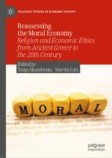Search
Search Results
-
“1914”
Historians of EuropeEurope speak of a long nineteenth century (1789–1914) beginning with the French RevolutionFrench Revolution, representing an...
-
Religious reforms and large-scale rebellions (via the case of the Honganji sect of the True Pure Land Buddhism)
The paper explores the economics behind two large-scale rebellions in Japan throughout 1532–1536 and 1570–1580, launched by a religious organization...
-
William of Ockham: An Unknown Libertarian Philosopher
William of Ockham is a little-known figure. However, his philosophical work is of extraordinary importance that is worth recovering. In this sense,...
-
The Emotional Decay of Liberalism: Trust, Polarization, and Affective Loo**
Liberal political order relies on high social trust. Trust is crucial in societies with diverse religious and moral perspectives, and diversity...
-
Caste, Faith, Gender: Determinants of Homeownership in Urban India
Analyzing a large dataset of urban non-slum households, we find that homeownership tenure choice in India is significantly associated with gender,...
-
Leading a “Simple” Life in Modern Capitalism. The Moral Economy of Mennonite Consumption in Mid-twentieth-century America
The concept of simplicity (Einfachheit) is crucial to understanding the way Mennonites engaged in the modern economy. Notions of simplicity derived...
-
Sincerely held beliefs: evidence on how religion in the classroom affects private school enrollments
Schools are one of the ways parents transmit their cultural values. US public education historically promoted Protestantism. We examine two conflicts...

-
India and ‘European’ evolutionary political economy
Evolutionary political economy (EPE) deals with populations and economic change over time but has not been systematised beyond European industrial...
-
The Big Shuffle: The East Asian World in the Era of Early Economic Globalization
Before the Ming Dynasty, several major cultural spheres had taken shape in the East Asian World. However, in the fifteenth century, significant...
-
Is the Islamic Religiosity Become the Cashless Behavior Among Muslim Community?
In Islam, the religiosity factor can also be an indicator that can influence the behavior patterns of individuals and society. If someone has high...
-
Protestant Doctrinal Heterodoxy and Heterogeneity in Guatemala 1880s to 1950s
At the beginning of the twentieth century, Pentecostalism disrupted the U.S. religion market. Charismatic beliefs and practices, particularly the...
-
International Financial Markets after the Financial Crisis
The financial crisis led to the worst depression since 1929. Only massive stimulus programs prevented worse. Here, the Keynesian theory was applied.
-
Introduction: Reassessing Moral Economy
Previous research on moral economy has focused on modern and non-religious aspects of economic life, in line with the moral economists’ (Tawney,...
-
Conclusion: Summary and Suggestion of Research Results
Modern society is undergoing globalization with neoliberal economic ideas at its center, and ensuing evils of social polarization are at a very...
-
COVID-19 and the Secular Theodicy: On Social Distancing, the Death of God and the Book of Job
In times of great distress, like in the case of the COVID-19 pandemic, people look for relief from the existential threat by searching for some kind...
-
Introduction
The introduction provides a guide to the objective of the book, which is to foster a multidisciplinary and multireligious understanding of the ties...
-
Understanding a wounded civilisation: a sociological reading of V. S. Naipaul’s Indian trilogy
Of the very few writers who could grasp the heart and mind of post-independence India, Nobel Laureate V. S. Naipaul was the foremost. In and to...
-
From Polytheism to Monotheism: Zoroaster and Some Economic Theory
The prophet Zoroaster founded the first monotheistic religion in history, which once rose to great imperial status and still survives unchanged today...

-
Introduction
Tracing the ideological origin and context of basic incomeBasic income, it becomes evident that the idea of basic income is a product of history...
-
A Discourse on Basic Income from the Perspectives of Reformed Spirituality and Feminist Theology
The female writer Virginia Woolf in her novel “A Room of One’s Own,” (1929), notes the requirement of a certain income (£500 a year) and an...
